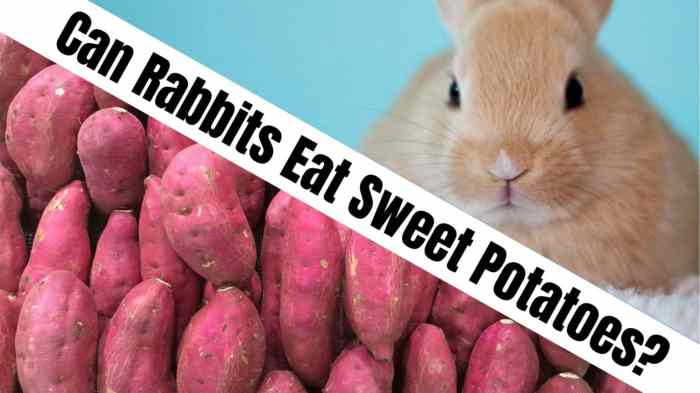Sweet potatoes are a popular and nutritious food for humans, but can rabbits enjoy this tasty treat as well? The answer is yes, but with a few important considerations. In this article, we’ll delve into the nutritional benefits of sweet potatoes for rabbits, provide safe consumption guidelines, discuss potential risks, and explore alternative rabbit-friendly vegetables.
Rabbits are herbivores with a unique digestive system that requires a specific diet to maintain optimal health. Sweet potatoes, while not a natural part of a rabbit’s diet, can be a healthy and occasional treat when fed in moderation.
Nutritional Benefits

Sweet potatoes are a nutritious food for rabbits, providing them with essential vitamins, minerals, and fiber.
The table below compares the nutritional content of sweet potatoes to other rabbit-friendly vegetables:
Nutritional Content of Sweet Potatoes and Other Rabbit-Friendly Vegetables
| Nutrient | Sweet Potato | Carrot | Celery |
|---|---|---|---|
| Calories | 86 | 25 | 6 |
| Protein | 1.6 g | 0.6 g | 0.7 g |
| Fat | 0.1 g | 0.2 g | 0.1 g |
| Carbohydrates | 20.1 g | 5.9 g | 1.2 g |
| Fiber | 2.5 g | 1.7 g | 0.6 g |
| Vitamin A | 1,183 IU | 11,107 IU | 138 IU |
| Vitamin C | 2.4 mg | 5.6 mg | 3.1 mg |
| Potassium | 269 mg | 187 mg | 104 mg |
| Calcium | 29 mg | 18 mg | 23 mg |
Safe Consumption Guidelines
To ensure the well-being of rabbits, it is crucial to establish appropriate consumption guidelines for sweet potatoes.
Sweet potatoes should be offered as an occasional treat, rather than a staple part of a rabbit’s diet. The recommended portion size is a small slice, approximately 1-2 tablespoons, once or twice a week.
Preparation for Safe Consumption
Before feeding sweet potatoes to rabbits, it is essential to prepare them appropriately:
- Wash thoroughly: Remove any dirt or debris from the sweet potato.
- Peel and cut: Peel the sweet potato and cut it into small, bite-sized pieces.
- Cook: Bake, steam, or boil the sweet potato until it is soft and easily mashed.
- Avoid seasoning: Do not add any salt, spices, or other seasonings to the sweet potato.
Potential Risks and Considerations
While sweet potatoes offer nutritional benefits, it’s essential to be aware of potential risks associated with feeding them to rabbits.
Excessive consumption of sweet potatoes can lead to digestive issues such as bloating, gas, or diarrhea. The high sugar content in sweet potatoes can also contribute to weight gain if fed in large quantities.
Minimizing Risks
To minimize these risks, monitor your rabbit’s consumption of sweet potatoes and limit them to occasional treats. It’s advisable to consult with a veterinarian before introducing sweet potatoes into your rabbit’s diet, especially if your rabbit has any underlying health conditions.
Alternative Rabbit-Friendly Vegetables
Besides sweet potatoes, several other vegetables offer similar nutritional benefits that can be safely incorporated into a rabbit’s diet. These alternatives provide a variety of nutrients, including vitamins, minerals, and fiber, essential for maintaining a healthy and balanced diet.
Broccoli
Broccoli is an excellent source of vitamins A, C, and K, as well as minerals like calcium and potassium. It also contains sulforaphane, a compound with potential cancer-fighting properties. However, it should be fed in moderation due to its high gas-producing potential.
Carrots
Carrots are a good source of vitamin A, which is crucial for eye health and immune function. They also contain beta-carotene, an antioxidant that may protect against certain types of cancer. However, excessive carrot consumption can lead to obesity and dental problems.
Bell Peppers
Bell peppers, especially green and red varieties, are rich in vitamins A and C, as well as antioxidants. They also provide dietary fiber, which aids in digestion and maintains a healthy weight.
Asparagus
Asparagus is a good source of vitamins A, C, and K, as well as folic acid and fiber. It contains antioxidants that may help protect against inflammation and chronic diseases.
Celery
Celery is low in calories and high in water content, making it a good choice for rabbits looking to maintain a healthy weight. It also contains vitamins A, C, and K, as well as potassium and fiber.
Summary
In conclusion, sweet potatoes can be a nutritious and occasional treat for rabbits when fed in moderation and prepared properly. By following the safe consumption guidelines, monitoring for potential risks, and consulting with a veterinarian if necessary, you can ensure that your rabbit enjoys the benefits of sweet potatoes without compromising their health.
Remember, a balanced and varied diet is essential for a rabbit’s well-being. Offer a variety of rabbit-friendly vegetables, hay, and pellets to meet their nutritional needs and keep them happy and healthy.
Questions and Answers
How often can I feed my rabbit sweet potatoes?
Sweet potatoes should be fed as an occasional treat, no more than once or twice a week.
What is the ideal portion size of sweet potato for rabbits?
A small slice, about the size of a rabbit’s thumb, is an appropriate portion.
Can I feed my rabbit raw sweet potatoes?
No, raw sweet potatoes can be difficult for rabbits to digest. Always cook sweet potatoes before feeding them to your rabbit.
What are some alternative rabbit-friendly vegetables to sweet potatoes?
Carrots, celery, bell peppers, and leafy greens like romaine lettuce and dandelion greens are all excellent choices.